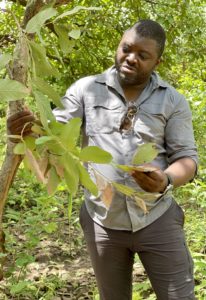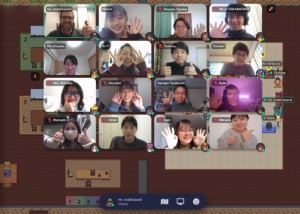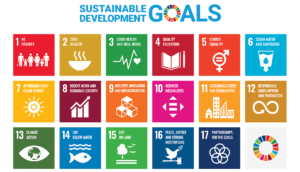by Alexandra DeMarco
- Making Connections with Faculty
- Global Research Opportunities Abound
- Supporting International Travel
- Global Health & Safety
- UN Sustainable Development Goals
- Contacting the Global Research Office

The Global Research Office team on the steps outside the CGE offices (left to right: Dr. Jamie McGowan, Shawn Lenker, Regis Nisengwe, Peggy Myers, Dr. Hannah Herrero)
Global engagement isn’t just for students, but faculty, too — and for faculty at the University of Tennessee, Knoxville, research collaborations provide a key way for faculty to pursue this engagement. The Global Research Office is here to help faculty.
The Global Research Office aims to help UT faculty leverage opportunities and pursue international research agendas, whether it be through helping apply for external research funding, offering internal grant funding or supporting global partnerships through Memoranda of Understanding, Memoranda of Agreement, or Letters of Intent.
Oftentimes, the person to launch the Global Research Office’s next international journey is the office’s director, Jamie McGowan. McGowan is the first person to hold the director position at the office and has a background in internationally-focused grant writing.
“We aim to support faculty research initiatives where faculty want to collaborate internationally, but we also aim to demonstrate the intellectual value of international collaboration,” McGowan said. “Through international collaboration, research is enhanced with new perspectives and insights, and the data demonstrates this fact. When scholars publish with international collaborators an array of bibliographic metrics demonstrate that their publications are more widely read and cited. These metrics are just one of the indicators of the value of partnering with scholars abroad. In essence, through the collaboration, alternative ways of assessing a particular research question are leveraged. Alternative tools, theories or contextual knowledge may be accessed and brought to bear on the research. It’s generally a win-win opportunity to collaborate with colleagues internationally.”
Making Connections with Faculty
To support global research grants, McGowan invites faculty to contact her about grant solicitations that are particularly compelling for their work. Like the Research Development team in the Office of Research, Innovation & Economic Development (ORIED), McGowan can help faculty put together a compelling proposal for funding their global engagement research and activities. Also, she works to foster interest in international opportunities by reaching out to faculty directly, based on existing grant notices. At times it is through serendipitous connections that McGowan supports a grant proposal, as she learns about someone putting together a significant proposal, she reaches about to the faculty to support the narrative’s development.

Professor Orou Gaoue conducts ecological research regarding human impacts on the environment in Benin
McGowan made one such serendipitous connection with Orou Gaoue, UT associate professor of Ecology and Evolutionary Biology. Gaoue collaborated with McGowan and the Global Research Office to apply for a National Science Foundation grant to lead three cohorts of students on research trips to Benin.
Gaoue was granted the award, and the first cohort of students is set to leave this summer. The international research program aims to address statistical anxiety among students by empowering them to build mathematical models from their own field research regarding the impact of human activity on mutualistic relationships in nature.
“I love his research plan and what he is doing, in part, because I found that he was was addressing a need amongst students, like test anxiety or math anxiety, statistical anxiety amongst students in a particular field, and showing them that this is possible but giving them a cool international research experience in learning how to address that,” McGowan said.
Global Research Opportunities Abound
For faculty interested in international research, CGE — in collaboration with ORIED — offers funding through the Global Catalyst Faculty Research Program. The program annually awards funding for faculty global research. Importantly, these funds support and leverage external grant opportunities that will further research connections. Faculty interested in applying should prepare their applications for next November.

A screenshot of the Friends Across the Sea program, which pairs Japanese students to UT students for a virtual learning experience
Global research and grants can take on many different forms. McGowan and her team at the Global Research Office have been on board for a plethora of international education opportunities, such as the English Language Institute’s Friends Across the Sea program this spring, which was funded through a Department of State grant and paired UT students with Japanese students for a virtual learning experience.
“Exposing myself to different research or faculty across campus is one of my favorite responsibilities of my work, as I get to learn about varied research activities that people are pursing. … In a sense, it’s just that exposure to different faculty’s research that’s exciting because it’s kind of like being a student in a lot of different classes,” McGowan said.
Supporting International Travel
With international research often comes international travel and all of the factors that must be considered when heading abroad. In the Global Research Office Assistant Director for Global Health and Safety Shawn Lenker and Administrative Coordinator Peggy Myers are charged with making sure international travel plans run smoothly — and responding when they don’t.
Myers joined UT seven years ago. Her main roles are approving international travel plans for travelers across the university and helping execute international agreements between partner institutions. Over the last several years, global health circumstances have made Myers’ work increasingly complicated.
“Especially with COVID, everything is twice as much work,” Myers said. “With COVID comes extra paperwork. Going through the experience of a pandemic, it’s extra important to know where people are and how to get them back home safe and making sure everybody has approval and can get reimbursements.”
Global Health & Safety
The pandemic has also influenced Lenker’s role. He helps faculty, staff and students traveling abroad to understand and mitigate potential risks, which have naturally increased during the pandemic.
“There’s still a lot of COVID risks to think through, and we still have travelers that are testing positive abroad or getting sick abroad, and so providing them care abroad, too, making sure they have support. … We want to make sure we’re supporting our people that are doing important university work abroad to the extent that we can do so,” Lenker said.
For any international trip, COVID-aside, Lenker works to ensure travelers understand risks prior to embarking on their trips, which often involves collaboration with entities like the Programs Abroad Office and International Student and Scholar Services.
But, Lenker’s role doesn’t end once travelers are abroad — he stays on call for emergency management. In his world, a day’s schedule is never quite predictable.
“If something happens that you need to respond to … (whether that’s somebody experiencing a physical or mental health crisis) you have to be able to drop everything and pivot to providing that emergency support,” Lenker said. “That’s always going to be key, is making sure our travelers have that frontline support if needed.”
In the case of an emergency abroad, Lenker contacts faculty or students abroad to ensure they are safe, which sometimes involves reaching out over social media if travelers are not responding to emails or phone calls.
“A lot of the challenges come from the emergency management side because like I said, being from a distance can be challenging, and so (whether it’s one person or several people who need support), part of what we have to do is (start by checking in),” Lenker said.
“A big part of my job is student, faculty, staff wellness and making sure they’re in a good place to accomplish their goals abroad, whether they’re doing research or they’re doing study earning credit, whatever it might be, but if you’re not in a good place in your own wellness, then it can be hard to show up 100% and provide that service and support,” Lenker said.
United Nations Sustainable Development Goals

The 17 United Nations Sustainable Development Goals
Among other projects, the Global Research Office has also been key in expanding UT’s involvement with the United Nations’ 17 Sustainable Development Goals. This year, the office welcomed an inaugural Global Sustainable Development Faculty Fellow, Hannah Herrero, to work on expanding understanding of the SDGs across campus.
Herrero is an assistant professor of geography at UT and has a background in international research pertaining to sustainability, particularly in Southern Africa. She has been central in UT’s efforts to “badge,” or label, courses pertaining to the SDGs in order to engage the UN’s goals and more easily connect students with the courses.
Herrero is also leading efforts to create an SDG certificate for students who take a certain number of SDG-badged courses.
“We’re currently working on creating a certificate program as well, and this certificate program will be offered hopefully next year and that will be focused on the SDGs, but it could also include a research or service learning component as well,” Herrero said.
As the inaugural faculty fellow for the SDGs, one of Herrero’s most prevalent goals is to increase students’ access to internationally-focused programs.
“International competency is something that is really important for us to continue to work on, bringing that experience to our students. … I think that’s just a very valuable component of my mission in general as an assistant professor at the university, and just broadening people’s horizons and intercultural understanding and exchange,” Herrero said.
To connect students with the SDGs, Herrero has also worked with Regis Nisengwe, the Global Research Office’s graduate student assistant for the Global Sustainable Development Goals, to create an online dashboard with quick information about the SDGs.
“He’s done an awesome job with that, so that faculty, students, staff can all see how SDGs are represented across campus, and then it also includes resources for finding classes that are SDG-badged and understanding our world rankings on different goals as well,” Herrero said.
Nisengwe, a PhD candidate in the natural resources doctoral program in the Department of Forestry, Wildlife and Fisheries, has been working on expanding the SDGs’ impact at UT.
He’s been involved in the SDG badging process, in addition to gathering evidence of UT’s involvement with the SDGS for the Times Higher Education Impact Rankings on the SDGs, which UT has participated in for the past three years.
“(The Times Higher Education) basically does the ranking, but based on how universities address SDGs, so that means we’re talking about (over a thousand) universities across the globe,” Nisengwe said.
Through his work, Nisengwe has been impressed by the scope of research he’s come across while investigating the SDGs at UT.
“There are things that you don’t know people are working on. … That’s something that you cannot find out unless you work with people who are actually involved in global research,” Nisengwe said. “I think that has been very fulfilling to me, to find people are working in Africa, Asia, South America.”
Contacting the Global Research Office
If you’re a UT faculty member looking to make a global impact with your research, the Global Research Office is here to connect with you. To learn more about available opportunities, visit the Global Research Office’s website.
CONTACT:
Jason Moody (865-974-5752, jmoody9@utk.edu)